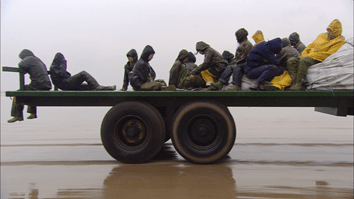A good safety manager is one who is aware of the social context of the job and the social consequences of injury on employees. The manager also needs to consider the operational parameters of the company. This is a difficult balancing act that many spend their careers trying to attain. But what if morality or legislative obligation was removed from the workplace, or was never there in the first place. How would employees be treated then?
GHOSTS is a movie, ostensibly, about one person, Ai Qin, who travelled illegally from China to England in order to earn a living, a living that she believed she could not achieve in China. As the opening scenes of the film show, she, and many others, are drowning in Morecambe Bay when the tide comes in rapidly while they are picking cockles. The reality behind this fictional film radically changed England’s approach to gangmasters and resulted in prosecutions of the operators of the cocklepicking business. Those operators were found responsible for the deaths of 23 cocklepickers in 2004.
As with many memorable films, the story of a single individual can fascinate and shame us at the same time. GHOSTS is not an enjoyable film as the hardship and the choices faced are uncomfortable to watch but it is an important film for many reasons. One is that gangmasters, and immoral companies, do not exist in a vacuum. Minor bribery, institutional ignorance, laziness and a disregard for human life are shown by various characters throughout the film. There are combinations of these elements which push Ai Qin into certain decisions where others would be provided with options.
Another is that we need to be reminded of these events. Often workplace tragedies fade as quickly as the media’s interest in them. People often follow events only as long as they are on the telly but this habit provides an extremely skewed view of reality. People are not expected to follow all issues, or be passionate about all the issues. That way lies madness, confusion and inaction. It is necessary to filter our ideological passions while retaining an interest in other related matters. We categorise our priorities in relation to our resources, emotions and circumstances at one particular time.
But investigations take time and the truth often appears years later, sometimes when the heat in an issue has diminished, or we have had to reprioritize, or the media is looking elsewhere. Outrage is always more attractive to the media than reason but we need to follow issues to their conclusion. This is why families revisit the heartache of a fatality by sitting through coronial inquests or prosecutions. They need to know the truth and find some answer to why the world has turned out as it has.
The conditions for trafficking, illegal migration and unregulated work continue in England today, just as they do in most countries. GHOSTS is not a film about sex trafficking. But whether people are being trafficked for sex, fruit picking, working in supermarkets or in take-away kitchens, is irrelevant. Trafficking is inhumane and must be actively discouraged.
The issue will grow in its economic, human rights and political significance.
It may be heresy to apply the hierarchy of controls outside the workplace safety domain but if safety professionals investigated the contributory factors behind trafficking, it would be hard to argue against the elimination of the hazard for a lower order control measure. If all physical journeys begin with a single step, then cultural change can begin with a single thought.
Victim support fund – http://www.ghosts.uk.com/


